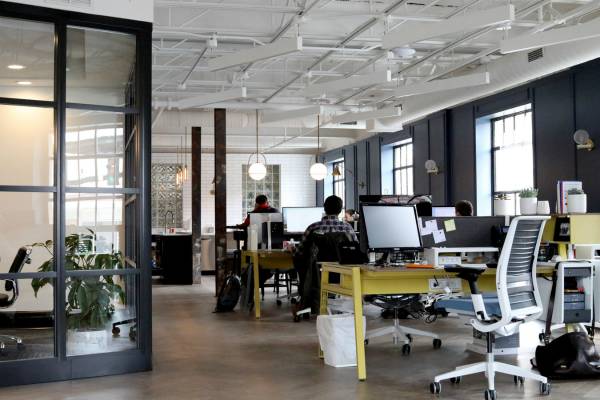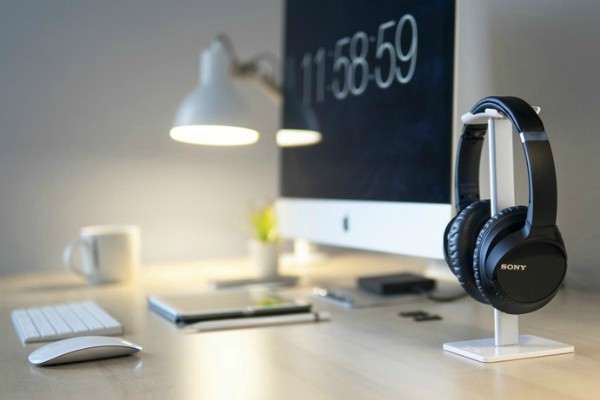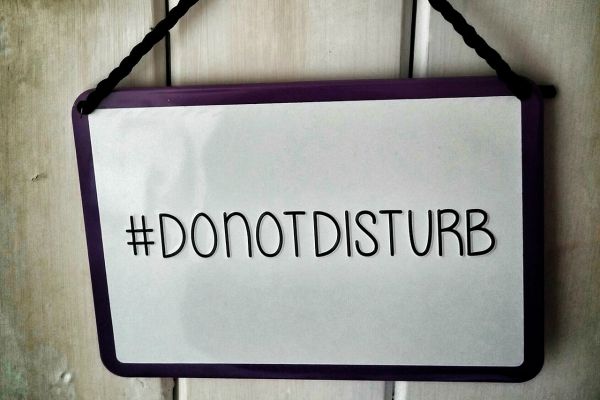In case you haven’t noticed, we live in a distracting world. And that doesn’t just apply to the spaces outside of our homes. Just ask anyone who works remotely how easy it is to get sidetracked by laundry, cleaning, or literally anything that isn’t work. So if you set a goal to improve focus this year, you know you’re up against some challenges. Like the chatter of coworkers, the constant flow of strangers in the café, or the bustling activity in a vibrant home. In short, it’s harder than ever to find a space to work that isn’t surrounded by distractions.
Luckily, you don’t have to. There are some science-backed strategies to improve focus no matter what your surroundings look like. Yes, even if you work in an open office. Mix and match these tips to find the best ones to get your head down and your work done.
How Our Environment Affects Our Focus

But first, let’s take a look at some of the ways our spaces affect us. More specifically, what do spaces with good intentions, like open offices, do to our focus?
Open office plans are a daily reality for many of us. But they’re not all they’re cracked up to be. For example, evidence suggests that background chatter impairs short-term memory and reasoning ability. And a recent study found that open office plans drive people to move their communication online instead of face-to-face—the opposite of the collaborative workspaces that the architects intended. Think you’re off the hook because you work from home? Think again. People who travel for work or tuck a workspace inside a busy home don’t have it much easier.
Given that distracting spaces aren’t going away any time soon, the next question is: What do we do about it?
While we’re all for setting yourself up with a less distracting environment, surrounded by natural sunlight and the sounds of nature, we also know that these things are often out of your control. Instead, let’s dig into how to make the most of your time in the distracting environment you’re in.
How to Improve Focus Wherever You Work
Here are nine ways to improve focus and concentration in any environment. Once you master these, you can be productive anywhere—just imagine the possibilities.
Make small changes to your space

1. Engineer your workspace. Whether it’s a full private office or part of a shared table, there are probably ways that you can adjust your physical workspace to better fit your needs. Turn your computer away from your charming but distracting best work friend. Put a plant between you and your neighbor with the habit of asking unnecessary questions. Clear off your desk at home.
2. Put limits on your digital temptations. If your phone notifications or the sweet siren call of your favorite website consistently distract you from work, there’s a simple fix. You can use do-not-disturb mode on your phone and a browser extension on your computer (like this one) to block access to those distracting websites. Need some tools and tech to get you started? Check out these productivity apps and time management apps for a more complete breakdown of your digital options.
3. Change your space to suit your task. When it comes time for an especially demanding task, have you considered moving from your normal desk to a café across the street, an open room on a different floor, or even your own home? This strategy works especially well if a big personal deadline of yours doesn’t align with the more relaxed vibes of coworkers who aren’t under as much pressure in the same timeframe.
4. Cover your ears. Headphones are fast becoming a standard sight in office environments, and for good reason. Music—especially styles without vocals—can boost your mood and performance while you work. For those of us who sometimes like to work in silence (but don’t want to be the one oddball wearing earplugs in the office), try some noise canceling, wireless headphones.
Adjust your mindset

5. Stick to a regular routine. Good or bad, the course of your day is closely tied to the habits you’ve established in the past. Whatever mix of focused work, collaboration with colleagues, and plain old socializing is best for you, the trick is to stick to a regular daily rhythm that lets you breezily switch between those roles.
For instance, you might start your day by catching up with your friends and then let both your coworkers and yourself know that it’s time to hunker down by slipping your headphones over your ears.
6. Reset your thoughts about distractions. It’s understandable if distractions make you feel frustrated and stressed, but those aren’t the only possible reactions. Researchers like Dr. Alia Crum describe how it’s possible to reset our negative thought patterns into more helpful ones.
You can reframe your thinking about all sorts of things. For example, is your noisy home a chaotic hurricane or a bustling family hub? Is your open office a pit of rude distractions or an opportunity for collaboration? You can train yourself to respond with the healthier, more positive mindset.
Listen to her talk about these concepts for more ways to tweak your perspective.
Lean into social cues

7. Use clear body language. Research shows that even though we rely on body language for communication every day, we’re actually not so good at reading it.
To communicate your desire to focus and concentrate, make your own body language as simple and easy to understand as possible. If you want to improve focus, turn your body squarely toward your work and slightly away from any would-be distractors.
8. Set some ground rules. Talk to the people around you—whether they’re family at home or colleagues at work—about expectations when someone is trying to work. Start with these ideas, and tweak the specifics to fit your unique situation.
- Come up with guidelines for what is or isn’t worth interrupting someone’s work and which types of communication are better suited for email or chat apps.
- Agree on a visual code with specific meanings for closed versus cracked doors, earbuds in one ear vs. both ears, or even make a literal thinking cap to keep distractors away.
- Borrow from the professors and set up specific office hours when you are happy to talk about anything. These hours can be individual or shared by the team.
9. Remember the golden rule. If you’re respectful and mindful of other people’s needs as they try to improve focus, they will be more likely to do the same for you in return. It’s not just something your kindergarten teacher used to say—it’s been documented for decades under the more academic name reciprocity.
To sum it all up…

Truth: It’s not possible to work in a completely distraction-free space most of the time. It is, however, possible to work with the environment you’re in so you’re more likely to be productive and successful. Not all of these tips will work for every situation, but we think you’ll find a few that can help you improve focus no matter where your office is.
Try to:
- Work with your individual workspace. Little tweaks, like clearing a desk or table, can make a big difference.
- Build a routine out of habits that add to, not detract from, your focus. Think about how and when to build in social time, set boundaries to indicate when you’re heads-down, and be intentional about your breaks.
- See your distractions from a more positive perspective by shifting your mindset.
- Use social cues to let people know when you mean business and respect others’ needs for focused work too.
Your turn: What’s your go-to tip to improve focus and concentration? Tell us what we’re missing in the comments.
Need more focus on focus? Here are five easy tips for avoiding distraction you can use right now.

Author: Scott Trimble
Scott researched human motivation at The University of Texas at Austin. He spends most of his time traveling, reading, teaching, and writing.

Let Us Know What You Think